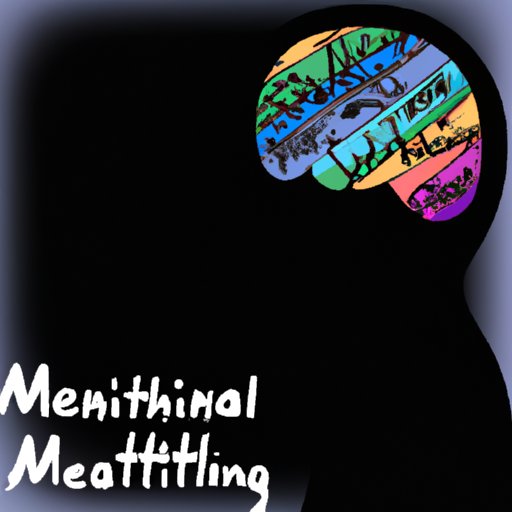Introduction
Mental health is a broad and complex concept that encompasses many different aspects of our lives and has far-reaching implications for our physical and emotional wellbeing, our relationships and our social environment. Mental health is often used interchangeably with mental illness, but there is an important distinction between the two terms. Mental health refers to an individual’s overall psychological state, while mental illness denotes a diagnosable condition or disorder.
The purpose of this article is to explore the definition of mental health, examine the different components of mental health, and discuss the causes and treatments of mental illness. We will also look at the importance of understanding mental health and its effects on physical and emotional well-being, as well as the role it plays in society.

Breaking Down the Basics of Mental Health: A Comprehensive Overview
Mental health is composed of several different components, including physical, emotional, cognitive, and behavioral elements. These components are interconnected and interact with one another in various ways, forming a complex system that influences our overall health and wellbeing.
There are many factors that can influence mental health, such as genetics, lifestyle, diet, environment, stress, trauma, and other external factors. It is also important to note that mental health is not static; it is constantly changing and evolving over time. This means that mental health can be improved through proactive care and interventions.
Mental health can be broken down into three main categories: physical, emotional, and cognitive. Each of these categories has its own unique set of characteristics and can be affected by different factors.

Exploring the Different Dimensions of Mental Health
Physical components of mental health refer to the body’s physical state, such as energy levels, sleep patterns, appetite, and general health. These aspects of mental health can be affected by physical illnesses, medications, and lifestyle choices.
Emotional components of mental health involve feelings and emotions, such as happiness, sadness, anger, fear, guilt, and shame. Emotional components of mental health can be affected by life experiences, relationships, and environmental factors.
Cognitive components of mental health include thinking and reasoning skills, such as problem solving, memory, and decision making. Cognitive components can be affected by mental illnesses, medications, lack of sleep, and substance use.
Understanding Mental Health: What is It and How Does it Impact Our Lives?
It is important to understand mental health and its implications for our physical, emotional, and social wellbeing. Mental health issues can affect our ability to function in everyday life, including our ability to work, study, interact with others, and maintain relationships. Mental health issues can also have a significant impact on physical health, leading to increased risk of diseases and decreased lifespan.
It is important to be aware of the signs and symptoms of mental health issues, such as changes in mood, energy level, appetite, sleep patterns, and concentration. If you or someone you know is exhibiting any of these signs, seek help from a qualified healthcare professional.
Mental Health: An Essential Component of Overall Well-Being
Maintaining good mental health is essential for overall wellbeing. Studies have shown a strong link between mental and physical health, with poor mental health contributing to an increased risk of physical illnesses, such as heart disease and diabetes.
Good mental health can provide numerous benefits, such as increased productivity, better relationships, improved physical health, and increased resilience to stress. There are many strategies for improving mental health, such as getting adequate rest, engaging in regular physical activity, eating a balanced diet, and spending time with friends and family.

Examining the Role of Mental Health in Society
Mental health is an important issue in today’s society, as it affects individuals, families, and communities. Mental health stigma still exists in many cultures, which can prevent people from seeking help and lead to feelings of shame and isolation. It is important to address mental health stigma and encourage open conversations about mental health issues.
Cultural views of mental health can vary widely, impacting how mental health issues are perceived and addressed. It is important to be aware of cultural differences when discussing mental health and to respect and honor different perspectives.
A Closer Look at Mental Illness and Mental Health
Mental illness is a diagnosable condition or disorder that affects an individual’s mental health. Mental illnesses can range in severity and can be caused by a variety of factors, such as genetics, environment, lifestyle, and trauma. Common types of mental illnesses include depression, anxiety, bipolar disorder, schizophrenia, and post-traumatic stress disorder.
Risk factors for mental illness include genetics, childhood trauma, chronic stress, and substance abuse. It is important to be aware of the warning signs of mental illness, such as changes in mood, energy level, appetite, sleep patterns, and concentration.
Treatment options for mental illness vary depending on the type and severity of the illness. Treatment typically includes medication, therapy, and lifestyle changes, such as getting adequate rest, engaging in regular physical activity, eating a balanced diet, and avoiding drugs and alcohol.
Mental Health: Its Definition, Causes, and Treatment Options
Mental health is an important and complex concept that can have far-reaching implications for our physical, emotional, and social wellbeing. It is composed of physical, emotional, and cognitive components and is influenced by many different factors. Mental health issues can have a significant impact on our lives and can lead to serious physical illnesses.
Mental illness is a diagnosable condition or disorder that affects an individual’s mental health. It is caused by a variety of factors and can have a range of symptoms. Treatment typically involves medication, therapy, and lifestyle changes. It is important to understand mental health and its effects in order to promote overall wellbeing.
Conclusion
In conclusion, mental health is an important and complex concept that can have far-reaching implications for our physical, emotional, and social wellbeing. It is composed of physical, emotional, and cognitive components and is influenced by many different factors. Mental health issues can have a significant impact on our lives and can lead to serious physical illnesses.
Mental illness is a diagnosable condition or disorder that affects an individual’s mental health. It is caused by a variety of factors and can have a range of symptoms. Treatment typically involves medication, therapy, and lifestyle changes. Understanding mental health and its implications is essential for promoting overall wellbeing.
(Note: Is this article not meeting your expectations? Do you have knowledge or insights to share? Unlock new opportunities and expand your reach by joining our authors team. Click Registration to join us and share your expertise with our readers.)
